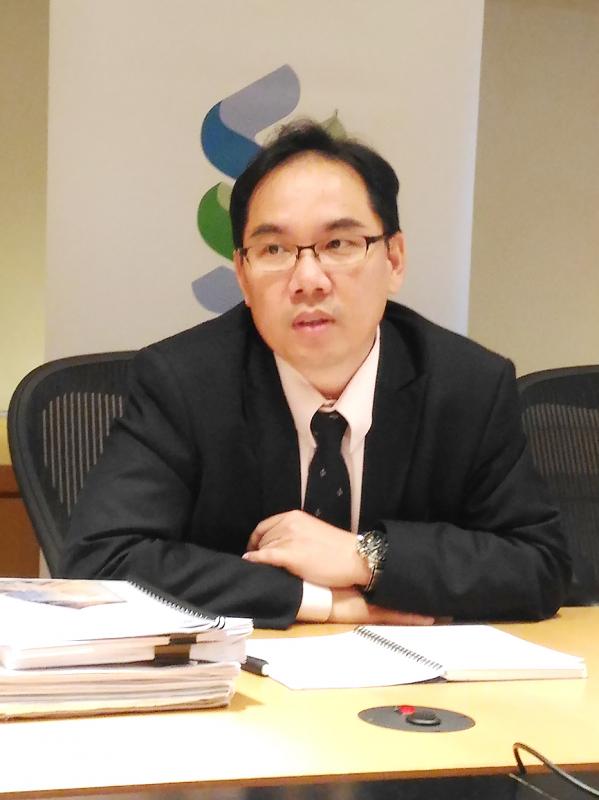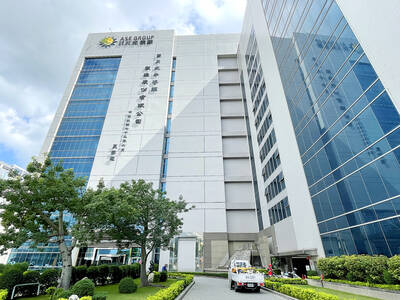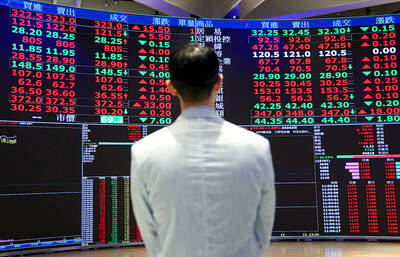Standard Chartered Bank Taiwan Ltd (渣打台灣銀行) yesterday forecast that the economy would grow 3.3 percent next year, following an expansion of 1.8 percent this year.
The projection was conservative compared with the government’s estimate and those predicted by other forecasters, as Standard Chartered is concerned about delayed COVID-19 vaccine distribution and slow private investment, it said.
The nation’s economy is likely to be affected by the slow recovery of the global economy next year, which would affect local tourism and exports of non-technology products, the bank added.

Photo: Lee Ching-hui, Taipei Times
The Directorate-General of Budget, Accounting and Statistics (DGBAS) last month forecast Taiwan’s GDP would rise 3.83 percent next year, while DBS Bank Ltd issued a 4.2 percent expansion forecast.
Meanwhile, most research agencies expect the vaccine distribution to begin worldwide in the second quarter next year and accelerate economic recovery.
However, Standard Chartered is skeptical about quick vaccine deliveries due to production challenges, and allocation and logistics issues, Tony Phoo (符銘財), a Taipei-based economist at the bank, told a news conference in Taipei.
“It remains uncertain how many COVID-19 vaccine doses can be produced next year,” Phoo said. “We assume that 1 billion doses would be produced annually, and it would take at least seven years to reach a high global immunization coverage.”
Assuming that herd immunity would be reached when at least 30 percent of the global population are vaccinated, it would still take a while to see the effect, Phoo said.
“We are facing a demand issue, not supply issues. Only when people feel safe and resume their consumption, the global economy will return to the pre-pandemic level,” he said.
The bank forecast that the nation’s private investment, mostly in the technology sector, would likely slow down next year, Phoo said, citing that imports of semiconductor equipment, a leading indicator of investment in the technology sector, declined 17 percent annually last month.
The prediction came in contrast to the DGBAS’ forecast that private investment would increase by a healthy 3.19 percent next year.
Besides the slowing imports of equipment, the high comparison base would also make it difficult for private investment to stage a strong rally next year, Phoo said.
The bank expects Taiwan’s private consumption to rebound next year, particularly in the second quarter, as the labor market would remain stable, he said.
The central bank would leave the benchmark interest rates unchanged next year, Phoo said, as global economic growth would remain weak and Taiwan’s headline inflation would rise modestly, at less than 1 percent.
The US-China trade tensions would be another potential risk for Taiwan’s economy, Phoo said.
The tensions are not expected to improve or deteriorate anytime soon, he added.

EXPANSION: The investment came as ASE in July told investors it would accelerate capacity growth to mitigate supply issues, and would boost spending by 16 percent ASE Technology Holding Co (ASE, 日月光投控), the world’s biggest chip assembly and testing service provider, yesterday said it is investing NT$17.6 billion (US$578.6 million) to build a new advanced chip packaging facility in Kaohsiung to cope with fast-growing demand from artificial intelligence (AI), high-performance-computing (HPC) and automotive applications. The new fab, called K18B, is to commence operation in the first quarter of 2028, offering chip-on-wafer-on-substrate (CoWoS) chip packaging and final testing services, ASE said in a statement. The fab is to create 2,000 new jobs upon its completion, ASE said. A wide spectrum of system-level chip packaging technologies would be available at

Taiwan’s foreign exchange reserves hit a record high at the end of last month, surpassing the US$600 billion mark for the first time, the central bank said yesterday. Last month, the country’s foreign exchange reserves rose US$5.51 billion from a month earlier to reach US$602.94 billion due to an increase in returns from the central bank’s portfolio management, the movement of other foreign currencies in the portfolio against the US dollar and the bank’s efforts to smooth the volatility of the New Taiwan dollar. Department of Foreign Exchange Director-General Eugene Tsai (蔡炯民)said a rate cut cycle launched by the US Federal Reserve

HEAVYWEIGHT: The TAIEX ended up 382.67 points, with about 280 of those points contributed by TSMC shares alone, which rose 2.56 percent to close at NT$1,400 Shares in Taiwan broke records at the end of yesterday’s session after contract chipmaker Taiwan Semiconductor Manufacturing Co (TSMC, 台積電) hit a fresh closing-high amid enthusiasm toward artificial intelligence (AI) development, dealers said. The TAIEX ended up 382.67 points, or 1.45 percent, at the day’s high of 26,761.06. Turnover totaled NT$463.09 billion (US$15.22 billion). “The local main board has repeatedly hit new closing highs in the past few sessions as investors continued to embrace high hopes about AI applications, taking cues from a strong showing in shares of US-based AI chip designer Nvidia Corp,” Hua Nan Securities Co (華南永昌證券) analyst Kevin Su

Nvidia Corp’s major server production partner Hon Hai Precision Industry Co (鴻海精密) reported 10.99 percent year-on-year growth in quarterly sales, signaling healthy demand for artificial intelligence (AI) infrastructure. Revenue totaled NT$2.06 trillion (US$67.72 billion) in the last quarter, in line with analysts’ projections, a company statement said. On a quarterly basis, revenue was up 14.47 percent. Hon Hai’s businesses cover four primary product segments: cloud and networking, smart consumer electronics, computing, and components and other products. Last quarter, “cloud and networking products delivered strong growth, components and other products demonstrated significant growth, while smart consumer electronics and computing products slightly declined,” compared with the